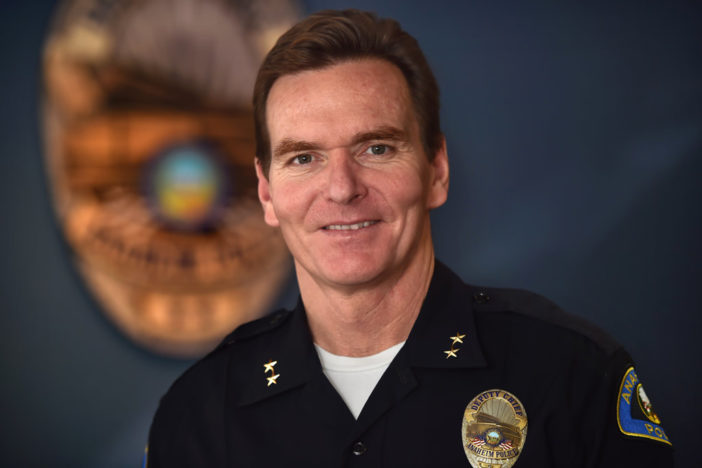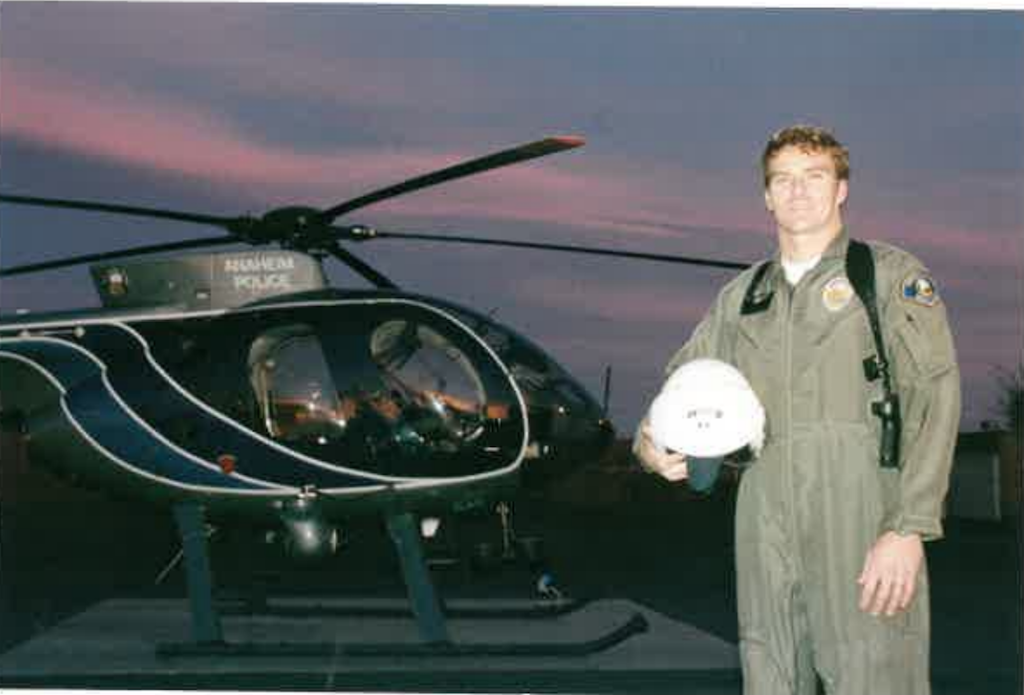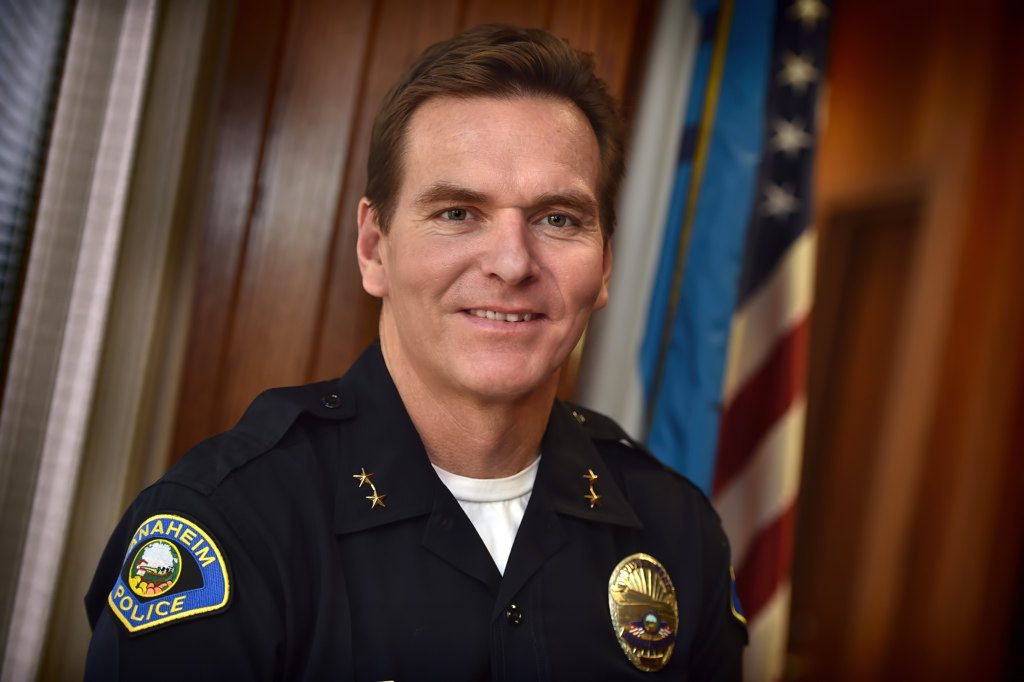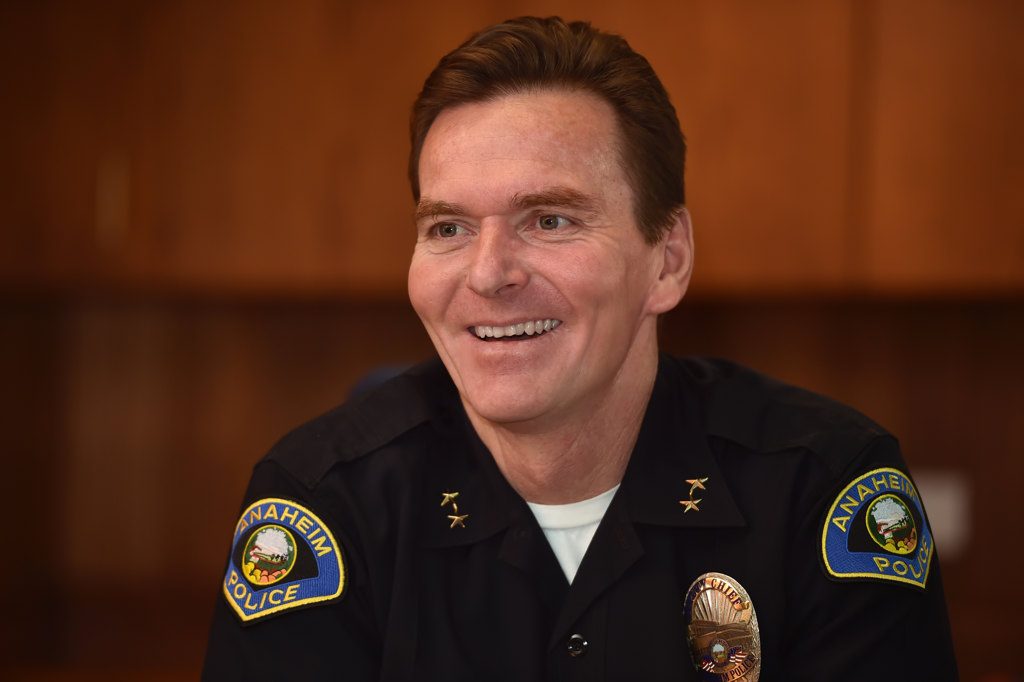The acting police chief calls early weekday mornings “magic time.”
Before heading to work, Julian Harvey makes breakfast for his 5-year-old daughter and 2-year-old son and spends time with them and his wife.
He then drops his daughter off at school and arrives at the Anaheim PD, typically around 8:30 a.m.
He walks into his office in his trademark T-shirt, shorts and flip-flops — a uniform befitting the former lifeguard and member of the U.S. National Water Polo Team — and then puts on his police uniform.
While not exactly “magic time,” running Orange County’s largest municipal law enforcement agency certainly is an invigorating and exciting challenge for Harvey, who started at the APD nearly 26 years ago and pretty much has done it all, serving as deputy chief for four years before being named acting chief in late October 2017 following the abrupt resignation of Chief Raul Quezada.
His days at the office are more like “crunch time,” with Harvey navigating the APD through a critical transition expected to last months, as other key positions in Anaheim, including city manager and city attorney, also await permanent hires.
Although Quezada, Anaheim’s first Latino chief who served for nearly four years, made significant progress repairing relations with the community following civil unrest that unfolded after a series of fatal police shootings in 2012, he resigned following a vote of no confidence from rank-and-file officers in August 2017.
Harvey, 50, who maintains a lean athletic build dating back to his years as a top-caliber water polo player, has made it clear that as acting chief, his approach to the job will be similar to how he conquered steep hills along the Laguna Beach coast in his prime running days.
“I’ve made it really clear in (staff meetings and briefings) and at community events that we’re going to take the high road during this transition,” Harvey said during a recent interview squeezed between his hectic, meeting-heavy schedule.
“There’s no time or place for disparaging comments (to be made by APD employees). Chief Quezada did a lot of good for this organization and moved us to places we never had been,” said Harvey, referring to such achievements as the creation of a neighborhood advisory council and equipping the APD’s 400-plus officers with body cameras.
“I had the privilege of working alongside him during that time, and regardless of what occurred, you can’t take that away from him,” Harvey said. “And I think it’s just counterproductive to dwell on (negative) things.”
QUICK TO ACT
Harvey moved quickly when he was named acting chief after Quezada stepped down on Oct. 23, 2017.
“I don’t have the luxury of sitting back and maintaining the status quo,” Harvey said. “It’s just not that kind of a world. You always have to be adapting and making incremental changes as needed to help keep the organization on the cutting edge.”
Harvey went to briefings and various APD unit meetings to listen to the concerns of his troops and to establish priorities.
One priority, he said, was beefing up patrol.
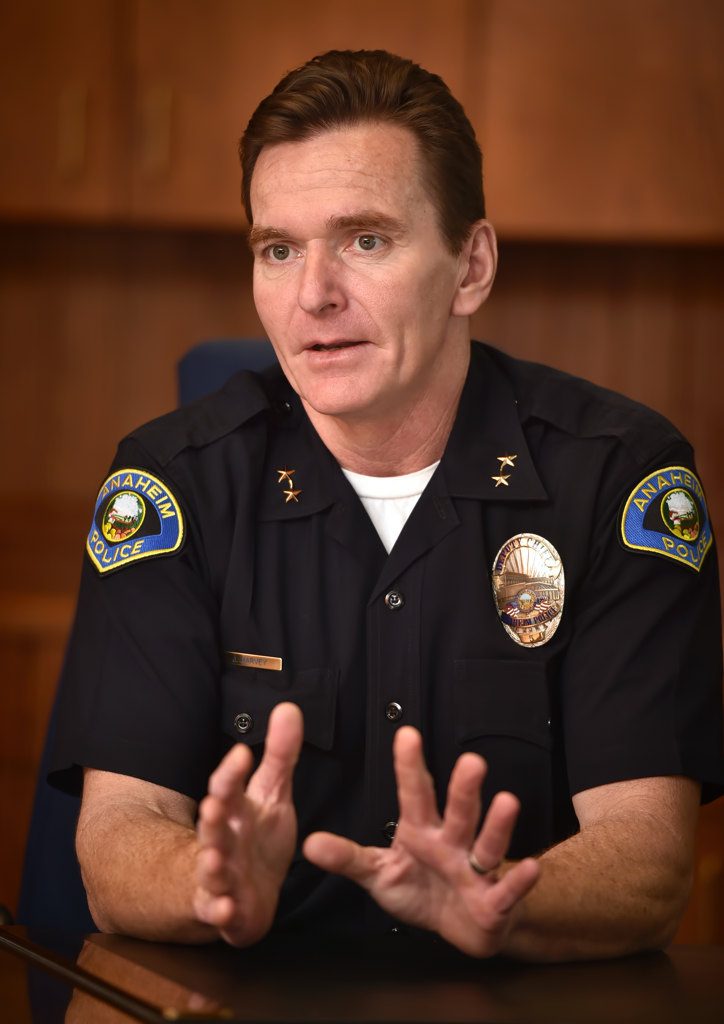
Anaheim PD Acting Chief Julian Harvey talks about the challenges that comes with his new role and what it means to the public the agency serves.
Photo by Steven Georges/Behind the Badge OC
“We were a little top heavy on our command staff,” said Harvey, who has kept two deputy chief and two lieutenant positions open, with no current plans to fill them.
“By not filling those four positions, you keep bodies in patrol, which helps lower response times (to calls),” Harvey said.
The strategy appears to be working.
The last two months of data shows a marked reduction in response time to priority one calls, down from 9 minutes to an average just over 7 minutes, the acting chief said.
Although violent crime in Anaheim jumped 3 percent in 2017 compared to 2016, overall crime was down 2 percent, thanks to a reduction in property crimes, Harvey said.
He’s particularly encouraged by what he calls a “significant” decline in crimes attributed to gangs between 2012 and 2018.
“We can bring to bear a lot of different approaches to impact gang crime, and we have done that very effectively,” said Harvey, citing intervention, diversion, enforcement and investigations.
He said Anna Drive, once a gang-run neighborhood and a focus of the 2012 civil unrest, today is largely free of the gang element. Back in 2012 and prior to that, gang members would be posted at both entrances of the street.
“Now, that’s gone,” Harvey said.
Bolstering patrol is part of Harvey’s back-to-basics priority, one of three he has shared with his APD colleagues as well as with the public at numerous community events.
“To be a very good agency, we need to assign the adequate number of resources to those things that make up our core mission: emergency response, investigation of crime, and prevention of crime,” Harvey said. “The more people you have in patrol, the greater the ability you have to do more thorough preliminary investigations and to actually get out there and prevent crime.”
Harvey has worked hard to prevent crime in a variety of positions at the APD, starting with patrol. He has served as a field training officer, a member of the SWAT team, a gang enforcement investigator, a helicopter pilot and a flight instructor.
In 2001, he was promoted to sergeant. In that capacity, he worked as a Patrol sergeant, Internal Affairs sergeant and as supervisor of the Gang Enforcement Unit.
In 2005, Harvey was promoted to police lieutenant. He was assigned as Patrol Watch Commander and then Bureau Commander in Strategic Services, Air Support, the Orange County Family Justice Center, Vice/Narcotics, Criminal Intelligence, and Crimes Against Persons Investigations.
After promoting to captain in 2012, Harvey led the Operations and Operations Support Divisions as well as the Tactical Response Group.
Harvey, who holds a master’s degree in Emergency Services Management from California State University Long Beach and earned a bachelor’s degree in Social Ecology from UC Irvine, has a soft spot for the Orange County Family Justice Center, which he ran for a few years.
The APD-launched center serves all Orange County victims of domestic violence, child abuse, elder abuse and sexual assaults. Harvey is a trustee for the OCFJC, which is committed to breaking the cycle of violence that grips and destroys countless families.
Despite the critical work being carried out each day at the OCFJC, Harvey believes most Anaheim residents don’t even know it exists.
“The lives that are changed at the (OCFJC) every day is just remarkable,” he said.
He added: “I wish the community knew more about the good we do every day. Investigations are happening every day where we’re taking guns off the street and taking dangerous criminals into custody with little or no force.”
Also, he said, APD officers — as well as members of the professional stuff — routinely do good deeds out of the spotlight.
For example, all seven detectives in the APD’s Family Protection Detail recently volunteered to become mentors to at-risk children and youth.
“No one asked them to do it,” Harvey said.
And last Christmas, members of the APD Gang Unit learned about a “wishing tree” at a home for adults with developmental disabilities. Clients wrote down their wishes and placed them on a Christmas tree. The gang detectives made sure each wish was fulfilled.
“They didn’t do it for recognition,” Harvey said. “They did it because they care about the community they’re serving.”
Harvey mentioned two other priorities he has, in addition to getting back to basics:
A focus on the internal, and a focus on increasing the agency’s role in the community.
“The people doing the work in our organization need to know they’re being supported, and they need to know they have the resources to get their jobs done,” Harvey said.
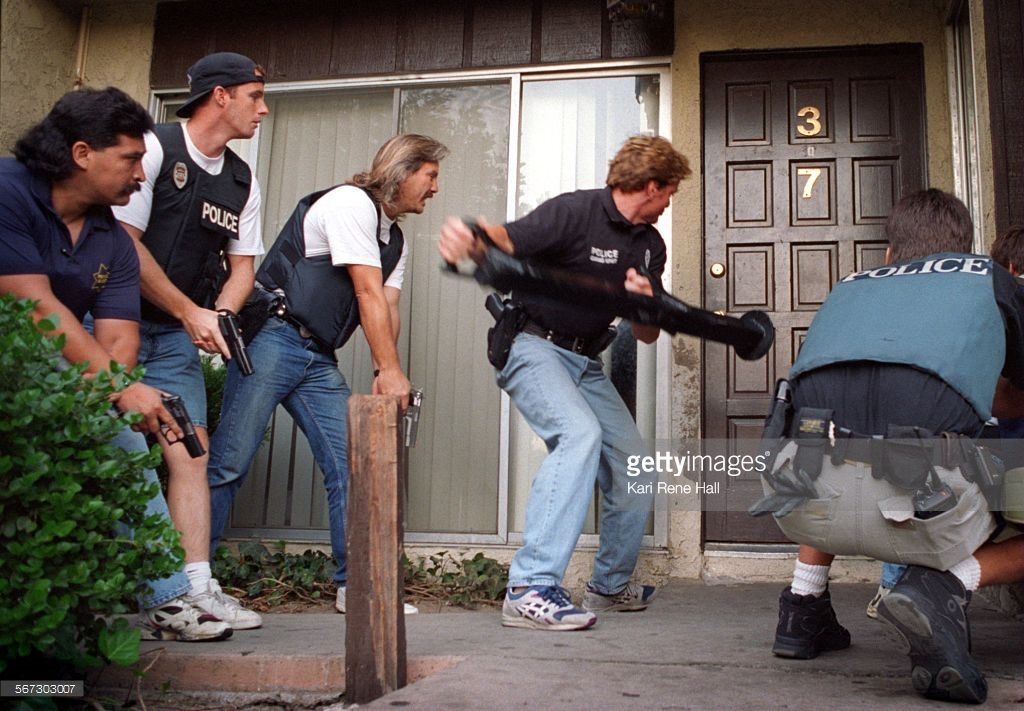
In this 1996 photo, Anaheim police use a battering ram to bust in a door at Olive Plaza Apartments in Anaheim looking for a crack-dealing suspect. Julian Harvey is holding the battering ram. Photo, provided by Julian Harvey, was taken by Kari Rene Hall/The LA Times
He’s getting out more around the agency to explain the “why” behind decisions being made, and to listen to rank-and-file officers and other employees to see how things can be improved.
As for the community, Harvey, who is fluent in Spanish (he used to surf a lot in Mexico), said it’s critical for the APD to make sure it’s delivering on its mission of keeping Anaheim safe.
“To get there,” he said, “we need to increase our level of engagement with the community and have more informal discussion with residents and visitors.”
Harvey called the homeless issue one of the most frustrating ones he’s faced in his career at the Anaheim PD.
“We commit significant resources toward addressing the impacts of homelessness in our city. Before we go down the road of enforcement, it all starts with outreach and the offering of services,” Harvey said.
Homelessness, he added, is a complex problem in which law enforcement agencies find themselves handcuffed in helping to solve.
“Unfortunately,” he said, “most of our tools are ineffective on their own. It takes a multi-pronged effort to truly move the ball and get individuals into stable housing and off the streets and riverbeds.”
EVOLUTION
Harvey believes the APD is one of the most transparent agencies in Orange County and beyond.
“The facts speak for themselves,” he said. “We’re the only agency with a police review board, our policy manual is online and we were the first agency in the county to deploy body-worn cameras.”
The APD’s Major Incident Review Team also is a model throughout the region, he added.
“While we know we’re not perfect,” Harvey said, “we know we constantly have to evolve. There are few agencies more focused on self-improvement than the Anaheim PD.”
Harvey, who was raised in Huntington Beach before his family relocated to Laguna Hills, fondly recalled his days in the late 1980s when he and his teammates on the U.S. National Water Polo Team traveled throughout Europe and countries within the former Soviet Union which were hotbeds of competitive water polo at the time.
And he fondly recalled his lifeguarding days that helped engender in him a desire for a career in public service. Harvey was a seasonal lifeguard in high school and college, and later served as a Marine Safety lieutenant for the City of Laguna Beach before joining the APD in 1992.
“It was a great job,” he said, “and often I look back and wonder why I ever left. But I always knew there was more out there, and I had the bug to go out and do policing.”
Harvey said he believes morale has improved at the APD under his four-month tenure as acting chief.
“Regarding our executive team, I’ve made it very clear that we’re stewards of this organization,” he said. “I’m not expecting everyone to go party at the (Colorado River) together, but we do need to get the work of the organization done.
“I’m very happy at the progress we’ve made in a short time to kind of put away differences and just focus on doing our jobs.”
Harvey likened his role of acting chief to running a law or medical practice.
“You get better at it the more you do it,” he said.
He added: “Not to sound self-serving, but I actually think (the transition) is going pretty well. (Acting chief) is a different role that you can only truly appreciate when you’re in it. Even as a deputy chief for many years, you think you can imagine yourself in this role, but until you’re the guy who the buck really stops with, you can’t really appreciate it.”
 Behind the Badge
Behind the Badge
